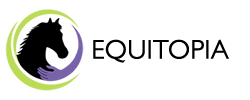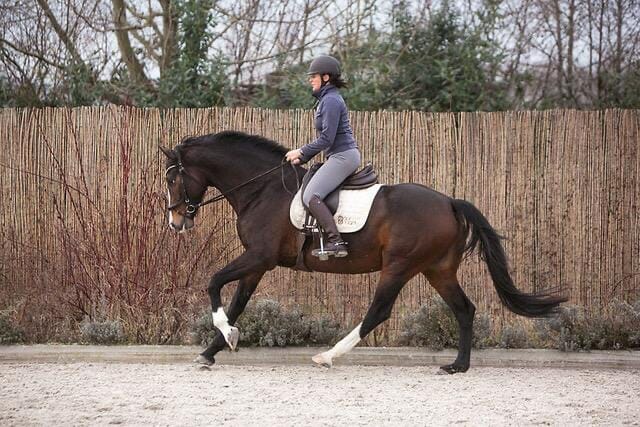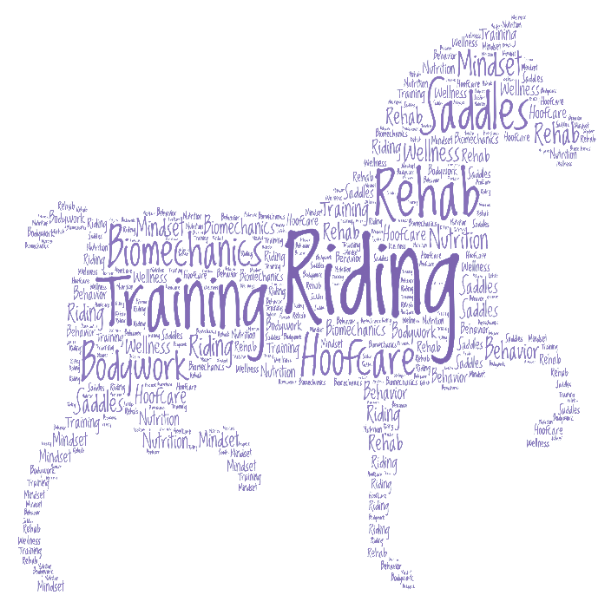TRUST IN THE HORSE & RIDER TEAM – BY ESTHER BERGER AND MONIQUE PANHUIJSEN
Something that I have realized over the past few years is that when you do right by your horse, and ride him in balance and on a soft rein, you learn just how important mutual trust is.
Years ago, I rode low deep and round (yes, I’ve been there as well, I am sorry) and I could go anywhere with my mare Apple. She was never stressed or scared, I could compete in any arena, ride out alone, pass everything, jump cross country, anything. My mare had the biggest heart you could imagine. Nothing was a problem for her.
About four years ago, I took a different road. Apple started getting problems in her legs and my other horse had a host of issues as well. It was high time for a change. Since then I’ve learned a great deal from a lot of different people. And I still do every day.
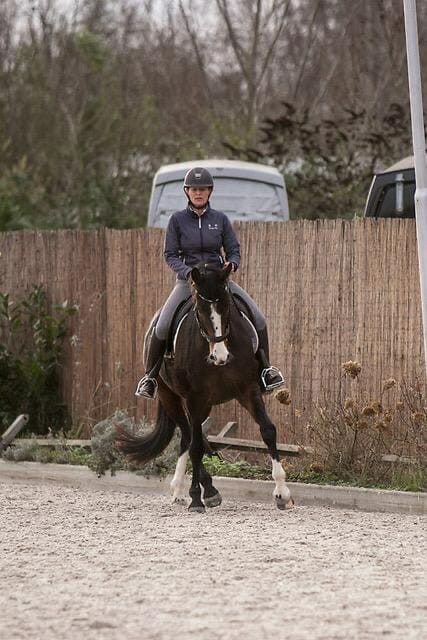
RIDING IN A HORSE-FRIENDLY WAY
I learned about riding in balance, straightness, healthy biomechanics, bodywork, hooves and so much more. Because at the end of the day all of this is interconnected. It has been a great journey up until now. My next goal is to start competing again, but in a different, horse-friendly way of course. However, I am faced with a new challenge. Apple (and all my horses) has opened up so much, she is back to her natural behavior. If something moves in the bushes, she wants to flee! So much for being able to go with her everywhere. What is “the problem”?
Riding in a forced posture like low deep and round makes the horse turn inward. Mentally, they are less comfortable, less themselves. I made my horse do all those things instead of asking her. Now, my horse has opened her eyes and mind, she uses all her senses. She can be a horse again. Which of course, I prefer, but it does bring an extra challenge. This is why building trust, making your horse feel comfortable and giving him the tools to be brave is even more important. I started working on trust with our trainer Monique Panhuijsen. What we aim to do, is give the horse the courage so that they know they can solve issues themselves.
WORKING WITH YOUR HORSE
This is how Monique describes it: “Riding with a light contact instead of enforcing control with the reins proves to be difficult, especially in a competition setting. With tight reins, you can simply instruct the horse what to do. The disadvantage of course is that a forced position has adverse effects on the health of the horse, both physically and mentally. But when you start to ride in a balanced and healthy way and let go of micromanaging your horse, you will discover that your horse may react differently. Because now, instead of dominating your horse, you are working with him. But does the horse know how to think for himself? Does he know he has a voice? This can be tricky, if the horse has always just been following orders. So, it will be tricky to just turn to your horse and say “we are doing things differently now, you have to think for yourself”.
The horse must be taught how to handle that. You have to guide the horse in learning how to think for himself, how to seek out solutions. Teach him that it’s ok to make mistakes and that you will be there to help when he needs you to. All of that requires good communication, patience and skill from a rider.
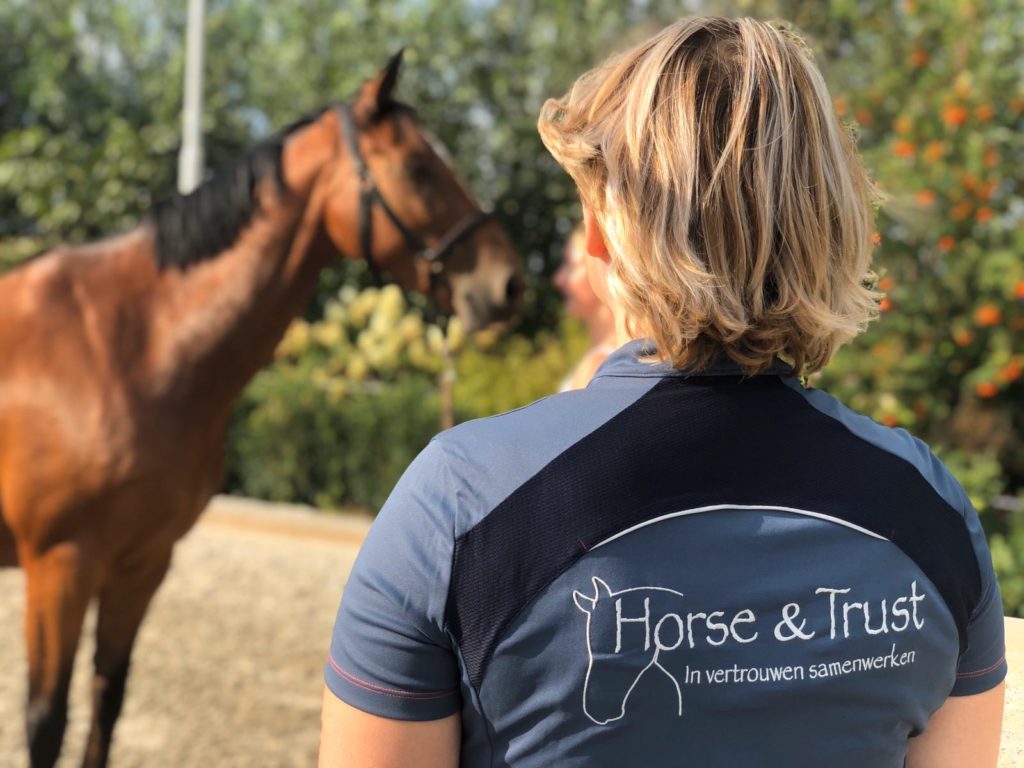
COMMUNICATING WITH YOUR HORSE
It is all about building trust and the communication with the horse is essential. You need to be able to recognize what your horse is saying and adjust your guidance to his voice. Be clear about what you are asking and understand what he is telling you. In this process it is important to avoid dangerous situations, so don’t forget you are still the one in charge, you have 51% of the votes. All of this not only applies to retraining horses, but to the education of youngsters as well. You want them to grow into balanced, confident and healthy horses. What I am trying to convey is keep working on your communication – support and help the horse learn. Start working together, as a team.
Of course, this does not happen overnight, it takes time and effort. But it is an investment well worth making. Nothing beats a genuine connection between a horse and rider. “
ABOUT THE AUTHORS
Esther Berger is the founder of EquiSmart, a Netherlands based company, devoted to responsible breeding, healthy training and horse-friendly husbandry. It is her mission to show to the equestrian world that it is possible to keep a horse happy and healthy and still be successful in competitions. She believes in the importance of making sure all the pieces fit together – from saddle fit and hoof balance, to nutrition and herd life. EquiSmart offers education for the modern trainer, individual lessons for riders of all levels. They also sell young horses that have had a good start, mentally and physically.
Monique Panhuijsen is a Certified Ruiter Coach Expert, who specializes in helping riders and owners find the connection with their horse. She helps riders understand what the horse is communicating at any given time. The goal is always to build self-confidence of the rider and the horse and use that to build mutual trust. She regularly teaches at the academy for future equestrian coaches and gives clinics and master classes.
IF YOU LIKED THIS POST, YOU MAY ALSO BE INTERESTED IN THESE:
BLOG POST: https://www.equitopiacenter.com/how-much-does-a-healthy-horse-cost-part-1/
ONLINE TRAINING COURSE: https://www.equitopiacenter.com/shop/compassionate-training-for-todays-sport-horse/
ONGOING EVENTS (WORLD WIDE): https://www.equitopiacenter.com/calendar/
